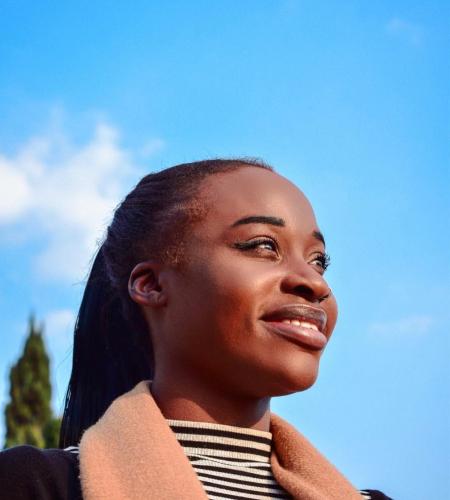Portrait

Fluent in English, Yoruba, Portuguese, and Spanish, this US and Nigerian citizen, holding both passports, now lives in Medellin, Colombia. A perfect candidate for the Atlantic Dialogues Emerging Leaders program, she was selected in 2017 to follow the program...
Born in the USA 27 years ago, Idia Irele grew up between Nigeria and the U.S. and moved to Boston when she was 10. Her family followed her father, Professor Francis Abiola Irele, a Nigerian academic who taught African and French literature at Harvard University. When asked about her studies, she states very factually that she was an undergraduate in Government and International Relations (Smith College), and has a Masters in International Education Policy (Harvard University). She works with social and emotional learning, and has experience in human rights education in the USA and Africa, with Boston Mobilization and UPLift Liberia.
Training young leaders in Latin America
Since 2017, she has worked as Director of Curriculum and Manager of Strategic Relations at the Latin American Leadership Academy (LALA). This is the South American version of the African Leadership Academy, she explains. So far, approximately 620 young leaders have taken part in intensive leadership bootcamps in different Latin American cities, with around 30 young leaders in each program at a growing rhythm of eight bootcamps per year and one residential program in Colombia.
“We focus on the potential of the continent and help build compassionate leadership to find solutions to persisting problems. The students are amazing young leaders. We support them in coming into their roles as community leaders and leveraging their stories and wisdom to gain access to wider platforms, both locally and globally. ” For instance, one student from Rio who created a nonprofit organization to work with incarcerated women in Brazil mastered the art of fundraising through participating in LALA. After raising $3,000 USD to come to LALA, she harnessed her newfound skill to launch a global campaign for her cause and raised $7,000 USD in only two weeks during the early months of the Covid-19 pandemic.
2020 has been a tough year, with the toll of Covid-19, a coup in Peru, a massacre in Lagos at the height of the #EndSARS movement against police brutality, as well as the death of Miguel da Silva in Brazil and Breonna Taylor, George Floyd, and countless other Black Americans in the United States.
“A five-year-old, Black Brazilian was killed shortly after George Floyd. During the pandemic, we have seen interconnectivity between all these events and transnational dialogue like never before. Women everywhere used their social media accounts to raise awareness about violence against women in Mexico and Turkey. Friends from around the world have used the EndSARS hashtag without ever having gone to Nigeria. This new, COVID-era globalization rests on true shared humanity.”
Idia is not just an observer. She is focused on action. “I started to explore the parallel between racial narratives across regions. The history of violence and enslavement in the US finds nearly identical parallels in Latin America. Just like in the U.S., the same racialized populations that were previously enslaved still lack opportunities to fully participate in society today. This is especially present in Colombia and Brazil, where despite narratives of ‘racial paradise,’ regions populated by Afro-descended and Indigenous communities face widespread poverty and barriers to fully representative leadership. I hope to continue advancing cross-continental dialogue through teaching history from the vantage point of multiple communities and organizing for social change. I teach young people to become closer to both themselves and the world, situating themselves in the issues around them and developing creative solutions to solve them.”
Africa on her mind
Idia’s vision is very clear: she plans to eventually become a U.S. diplomat in order to achieve “a more direct, impactful leadership in the future, working in international development, human rights, and responsible governance more broadly.”
Africa is on her mind. She hopes that the continent will play a more “prominent role globally, not only exporting raw materials, but also more products and services. As a producer of cocoa, coffee, rubber and coltan in addition to music, art, and other cultural influences, African countries play an important role in the global market, but this essential role is not widely recognized in the international community.” She believes in South-South relations and the collective development of the Global South. “There are more Afro-descended individuals in Brazil than anywhere else in the diaspora, this legacy provides an enormous opportunity for stronger connections between the two regions.”
Among her role models, she mentions her mother, who grew up through decades-long political strife in Calabar, a coastal town that played a pivotal role in the conflict between Nigeria and what was once the secessionist Republic of Biafra. She also admires Chimamanda Ngozi Adichie, “a woman who has paved her way in literature, writing stories about everyday Nigerian people not to explain, but to seamlessly immerse people in her characters’ worlds, whose universally human struggles and considerations are ones that everybody can identify with.” The Nigerian writer is the author of one of Idia’s favorite books, Half of a Yellow Sun, a story that enabled her to discover more about her own family’s history.

